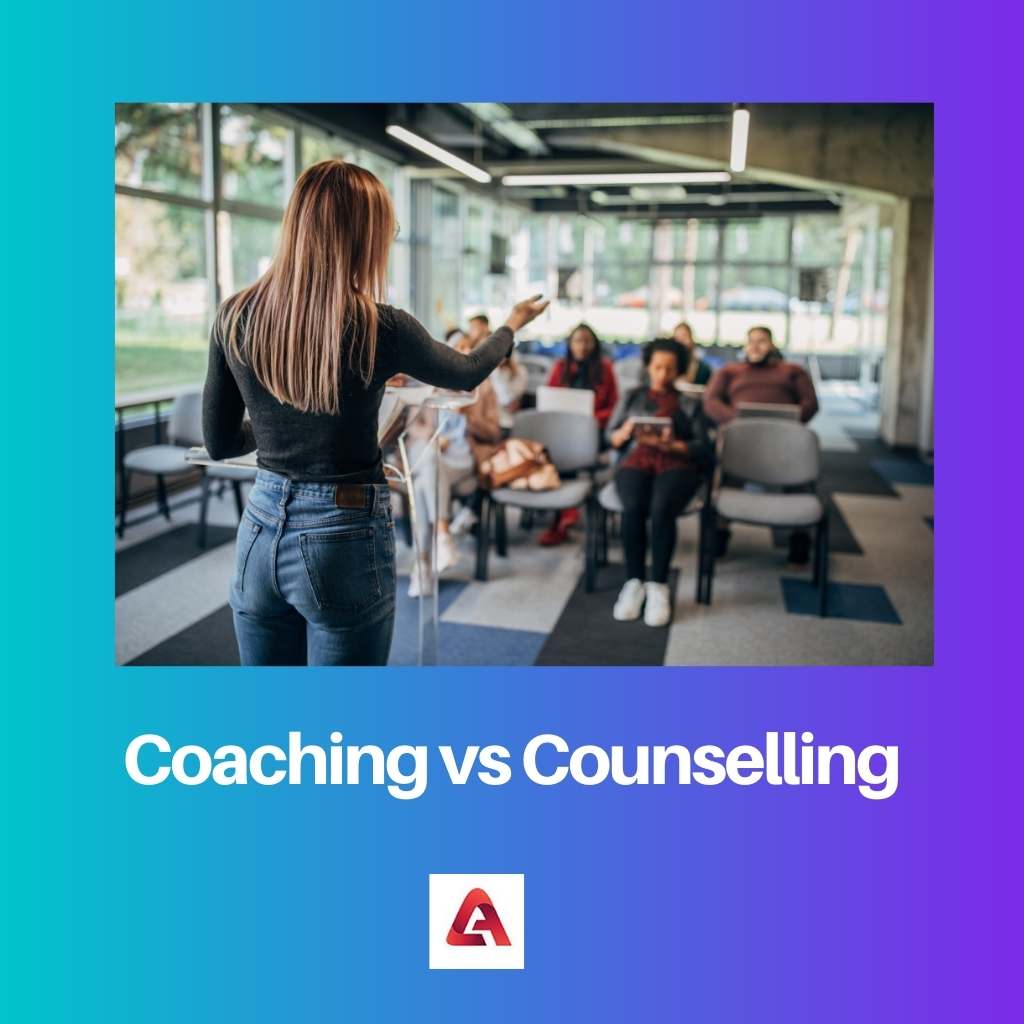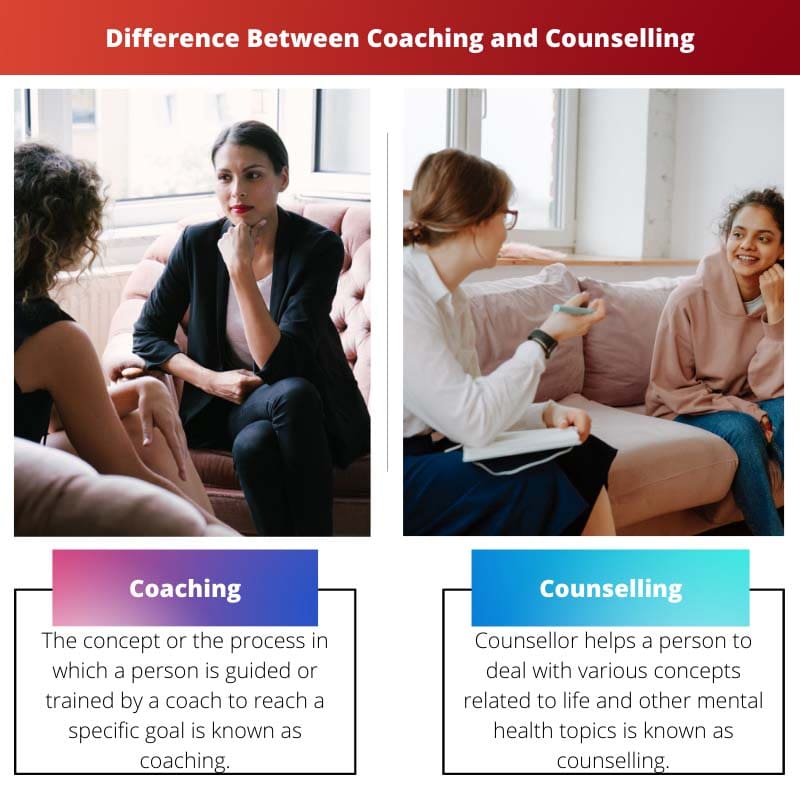There exist several concepts and theories that a person tries to understand. A person tries to do so on their own, or he or she seeks help from their tutor.
This whole concept of learning things and implementing that knowledge is important. One can understand several concepts under somebody’s tutelage.
Whenever a person gets proper guidance, he or she is most likely to succeed in whichever field they want to. A good guide will always help a person to succeed in their life with their wholesome teaching.
There are two concepts like this, namely 1. Coaching, and 2. Counselling.
Key Takeaways
- Coaching focuses on enhancing an individual’s skills and abilities while counselling concentrates on helping individuals cope with emotional distress.
- Coaching sessions are shorter in duration and goal-oriented, while counselling sessions are more extended and problem-oriented.
- Coaching is conducted in a workplace setting to increase performance, while counselling is frequently conducted in a clinical setting to address mental health issues.
Coaching vs Counselling
The difference between Coaching and counselling is what these concepts deal with. In coaching, a coach helps a person to achieve a specific aim or goal that a person decides. On the other hand, counselling deals with a counsellor that helps a person to deal with the problems and difficulties that a person faces in his or her life.

The concept or the process in which a person is guided or trained by a coach to reach a specific goal is known as Coaching. A coach is a person who is an expert in the respective field.
A coach is a person who has enough experience and has gained expertise in the respective field to guide his pupil or coachee. A coachee is a person who seeks to coach for the coach.
The concept or the process in which a counsellor helps a person to deal with various concepts related to life and other mental health topics are known as counselling. A counsellor is a person who uses his or her study and knowledge regarding the psychology of different types that different people possess.
People find it difficult to cope with the stress and other issues they have to deal with. During such times, counselling sessions are quite useful.
Comparison Table
| Parameters of Comparison | Coaching | Counselling |
|---|---|---|
| Meaning/ Definition | The concept or the process in which a person is guided or trained by a coach to reach a specific goal is known as coaching. | The concept or the process in which a counsellor helps a person to deal with various concepts related to life and other mental health topics are known as counselling. |
| Person with expertise | The person with expertise is called a coach. | The person with expertise is called a counsellor. |
| Focuses on | Working hard in the present to build and achieve success in future. | Working on the issues that took place in the past or that are still going on in a person’s life. |
| Helps to | Coaching helps a person to set their goals and work hard to achieve those goals. | Counselling helps a person acknowledge the issues and try to resolve them. |
| Supervision | Coaches are not supervised. | Counsellors are supervised. |
What is Coaching?
Coaching is a process that involves a coach and a coachee. A coach is a person with expertise who trains the coachee to set their aim and goals and guides the coachee to achieve that target.
It is a process where a coachee learns several things about the field in which he is seeking training in.
Today, Coaching is available in various fields like sports, arts, acting etc. Various sports require appropriate Coaching so that the player can stay fit on the field and improve his or her game.
Coaching is required in many forms of art like painting, drawing etc. In acting, you require coaches to train you regarding the deep study of acting and its various forms.
Different coaches use different techniques, and each coach has their teaching and preaching style. Some coaches use different teaching aids to make their coachee understand a particular concept.
They make sure that the technique works and that the coachee understands and implements that particular lesson in the practical experience.
There are various examples of coaches and coachees that are famous for their mentor-and-mentee relationships. Coaches play an important role in a person’s life. They not only teach about a particular field, but they also teach life lessons through the lessons.
Sometimes they try to relate the main subject matter to the various life lessons that a coachee might learn and implement.

What is Counselling?
Counselling is a process that involves a counsellor. A counsellor helps a person deal with different concepts of life.
They also help to deal with the difficulties that a person may face in their life. They also try to help a person who is dealing with past trauma or what they might have faced in their past.
Today, the entire concept of mental health and the things that are related to it are being talked about, and people are addressing many issues. People try to suppress their problems by ignoring them or by distracting themselves from the problem, which further leads to an even bigger problem.
This and many other reasons prove that people must believe in counselling, and they should seek proper advice from the counsellor.
A counsellor is a person with expertise who helps people in many ways. The history of counselling therapy and the need to address mental health issues dates back to the time when World War II ended.
In the USA, the military felt a need for vocational training. That gave inception to the concept of counselling psychology.
A counsellor is licensed to practice therapy sessions. Even though they are licensed to practice their knowledge, certain authorities still supervise them.
The entire concept of counselling can prove to be of great help if it is done right. A good counsellor will always help the person that comes to them in their need.
A counsellor talks to the person, gets to know them and their issues and tries to resolve them by using various psychological techniques.

Main Differences Between Coaching and Counselling
- In Coaching, coaches don’t diagnose and treat. They train and guide their tutors in the particular field they opt for. On the other hand, in counselling, a counsellor diagnoses and treats the patient.
- In Coaching, the person with expertise is addressed as a “coach,” on the other hand, in counselling, the person with expertise is addressed as a therapist, counsellor, psychologist etc.
- In Coaching, the focus is put on the present and future. On the other hand, in counselling, the focus is put on the past and present.
- In Coaching, the client is considered whole. On the other hand, in counselling, the assumption is made that the client needs healing.
- In Coaching, a person is trained to gain maximum results and strategies are taught. On the other hand, in counselling, a person is guided to stabilize themselves and their life by resolving their issues.

- https://usacac.army.mil/sites/default/files/documents/cace/DCL/DCL_Mentoring.pdf
- https://psycnet.apa.org/record/1979-02443-001

Coaching and counselling have specific focuses and set of experiences, both critical for individual growth and development.
Yes, they offer distinct but complementary benefits, and understanding the difference is essential for everyone.
Absolutely, these processes are crucially important for personal and professional growth.
Coaching utilizes different techniques and teaching styles to help individuals with goal setting and achievement. It’s fascinating!
The mentor-and-mentee relationships in coaching are crucial, as they impart not only knowledge but valuable life lessons.
Coaching and counselling require expertise, and both play unique roles in helping people achieve their goals and addressing mental health problems.
Coaching is goal-oriented and implemented to increase performance, while counselling is needed to help individuals cope with emotional distress.
Counsellors play a significant role in addressing mental health issues and should be sought for advice and guidance.
Coaching and counselling are two important ways for people to learn new skills and deal with mental health. Coaches help someone achieve a goal while counselling addresses mental health issues.
Absolutely, the difference between coaching and counselling is clear and crucial to understand.
Both are essential for the growth and development of people.
The role of coaching and counselling in various fields like sports, arts, and acting is essential in developing skills and maintaining mental health.